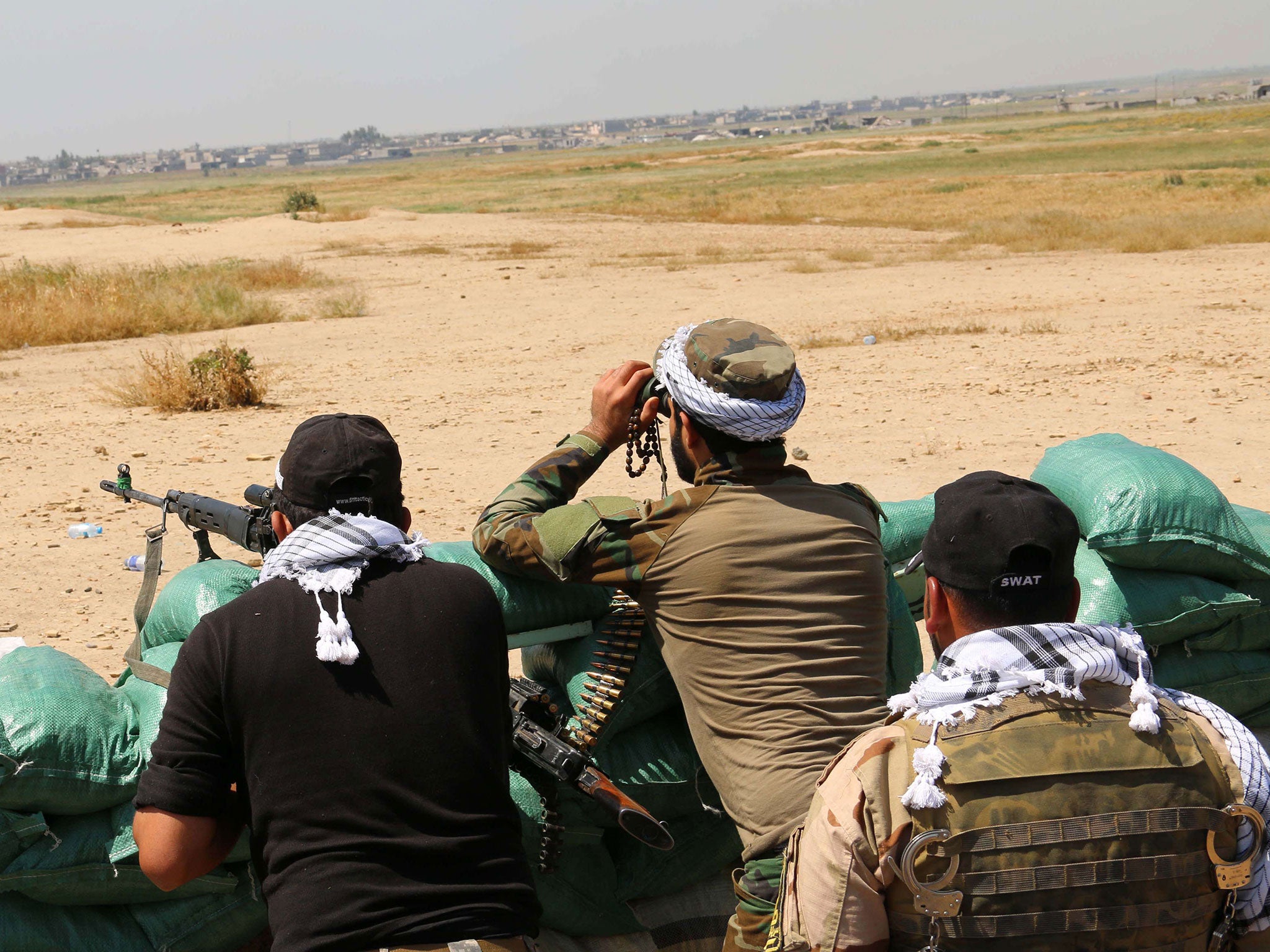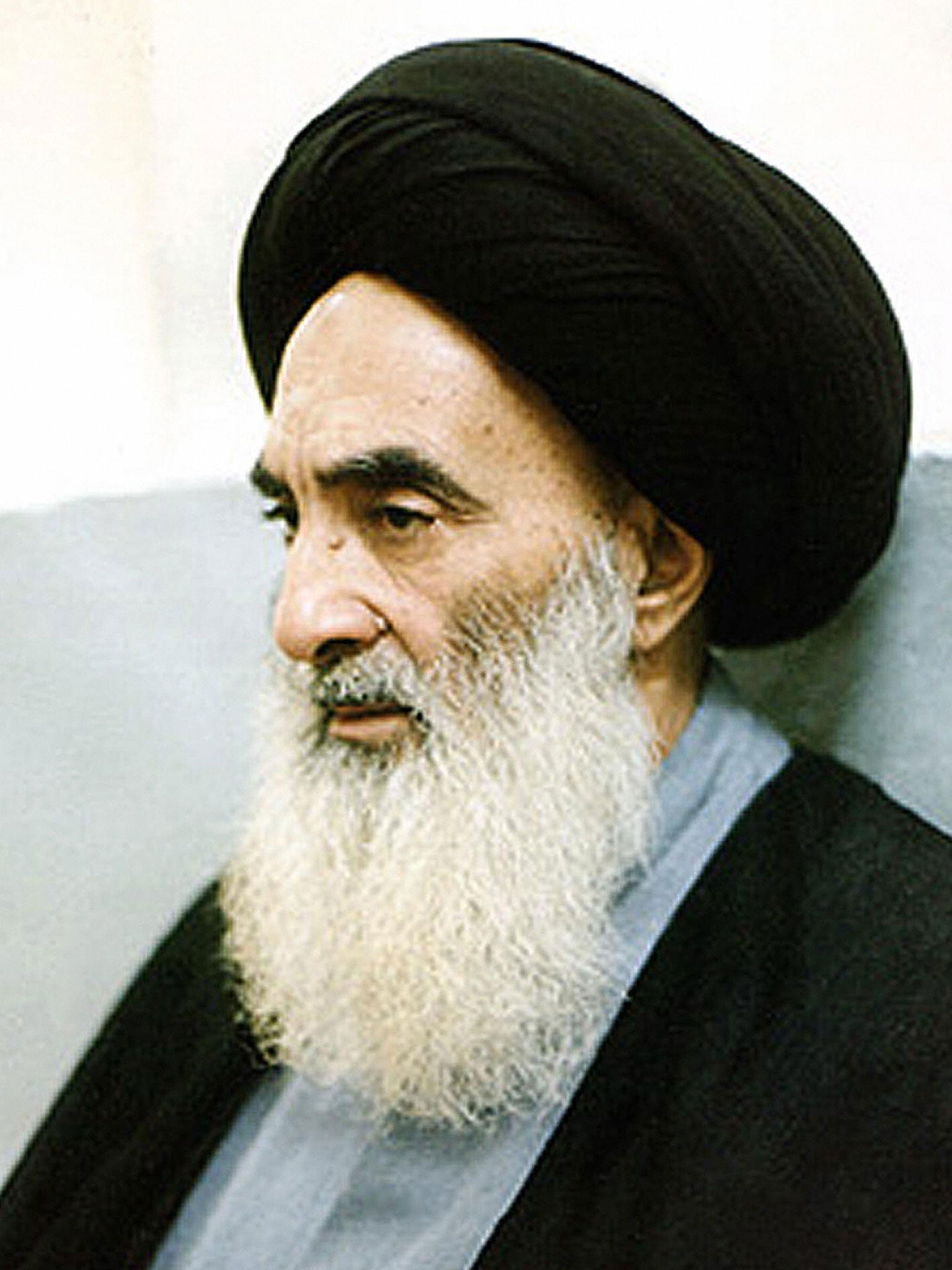Isis in Iraq: Kurdish Peshmerga and Iraqi Shia militias form wary 'marriage of convenience' to oust Islamist insurgents ahead of push on Kirkuk
The Kurdish Peshmerga and the Shia militias of Iraq are not natural allies – but with a common enemy in the form of Isis, they must rely on each other if they are to liberate their homes. Cathy Otten reports from near Kirkuk

Among the lush meadows that cover the countryside around Kirkuk, fighters from the village of Bashir look toward their home. Flanked by the brightly coloured banners of one of Iraq’s Shia militias, they are preparing an attack on the Isis snipers who stalk the otherwise empty streets of the village, one mile away.
Not far off are the Kurdish Peshmerga, waiting for the command to push Isis further back from the Kurdish-controlled city of Kirkuk, the capital of its eponymous governorate, 12 miles to the north. The fighters have a common foe, but on the ground cooperation is carried out warily.
Situated on the edge of Iraqi Kurdistan – protected by the Peshmerga – rows persist in Kirkuk over ethnically mixed pockets of land. Some Arabs and Shia Turkmen remain wary of Kurdish control.
The rise of Isis has meant a need for battlefield cooperation between the groups. Jabar Yawar, the secretary-general of the Ministry of Peshmerga, said that Shia militias have no place in Kirkuk city but have fought on the outskirts.
“They took part in some military operations after Isis attacked these areas. We will deal with them as volunteer forces,” he said.
The coordination is “a marriage of convenience, not a strategic alliance”, according to Michael Stephens, the research fellow for Middle East Studies at the Royal United Services Institute.
Following a call to arms by Iraqi Shia cleric Grand Ayatollah al-Sistani last summer, thousands of men have joined the popular mobilisation forces – an alignment of government-supported paramilitary groups.
The role of these militias – many of which are supported by Iran – is growing, following victories in the city of Tikrit and province of Diyala alongside regular forces earlier this year. But in historically diverse areas such as Kirkuk, their presence is not without its controversies.
It has been 10 months since Isis captured the village. Last June, residents from Bashir described how they buried 18 bodies in the nearby town of Taza as they fled Isis, who view Shias as apostates.
“We didn’t have the power or the force,” said Major Abdul Hussein Abbas, reflecting on their defeat last year. He is now training new fighters from the popular mobilisation at a base near the front line.
But the advance on their hometown has been stalled. During one attempt to retake the town last month, militiamen took three miles of territory and a smattering of villages from Isis. They then had to wait for reinforcements and teams to defuse IEDs – the homemade bombs Isis have deployed widely and to deadly success.
Religious fervour is apparent among the fighters. Many directly reference Ayatollah Sistani’s call to arms, and speak reverentially of martyrdom.

Abu Mikhail, 24, a carpenter and now a fighter on the Bashir front, told The Independent he joined the force after Ayatollah Sistani’s fatwa. “I am fighting for my faith, my country and my brother who was martyred here trying to take back Bashir,” he said. A week later, Mikhail died, a victim of an Isis car bomb.
READ MORE: The everyday reality of living in the Islamic 'Caliphate'
Iraq's government fights to win back Tikrit
Cameron 'needs to do more in fight against Isis'
Major Abbas was based in Kirkuk with the Iraqi army before they fled in the face of the Isis attack, but this time around, he says: “We are fighting with faith because the fatwa gave power to the Iraqi people.”
Kirkuk has long been home to a diverse population and is dotted with Sunni Arab villages. The legacy of displacement during the rule of Saddam Hussein’s Sunni Baathists has further undermined relations.
Major Abbas, a Shia Turkmen and native of Bashir, was displaced in 1986. “Saddam destroyed our houses and brought in Arab [villagers]. He cleared the village and made us refugees inside Iraq,” he said. He adds that he won’t be forced to leave again.
Major Abbas and Shaker Hassan Ali, a spokesperson from the Shia Badr Organisation in Kirkuk, are quick to point out that they have Sunni fighters among their ranks. They rubbish suggestions that the heightened religious overtones to the battle could deepen divisions between Iraqis.
But human rights organisations have documented killings and abductions by government-backed Shia militias, as well as the burning and looting of property in towns retaken from Isis.
Major Abbas tells The Independent that in a town retaken from Isis last month he stopped another unit trying to steal a resident’s belongings. “I am military, I know what would happen,” he says. “I don’t want my unit to have a problem with that.” He also blames the media for reporting that the popular mobilisation forces were blowing up mosques when, he says, Isis fighters were responsible.
If operations south of Kirkuk are successful, it may be because the militiamen come from the local population, said Ahmed Ali, a senior fellow and director of the Iraq Security and Humanitarian Monitor project at the Iraqi peace NGO Epic.
“This fact makes it easier for them to act as an attacking and holding force, since they know the area and can potentially get the support of the locals. This method could be used in other mixed areas of Iraq,” said Mr Ali.
But the challenge will be for the popular mobilisation forces to avoid acts of retribution in areas cleared of Isis. “That’s a pitfall some popular mobilisation forces have jumped into in other areas of Iraq,” he said.
Join our commenting forum
Join thought-provoking conversations, follow other Independent readers and see their replies
Comments